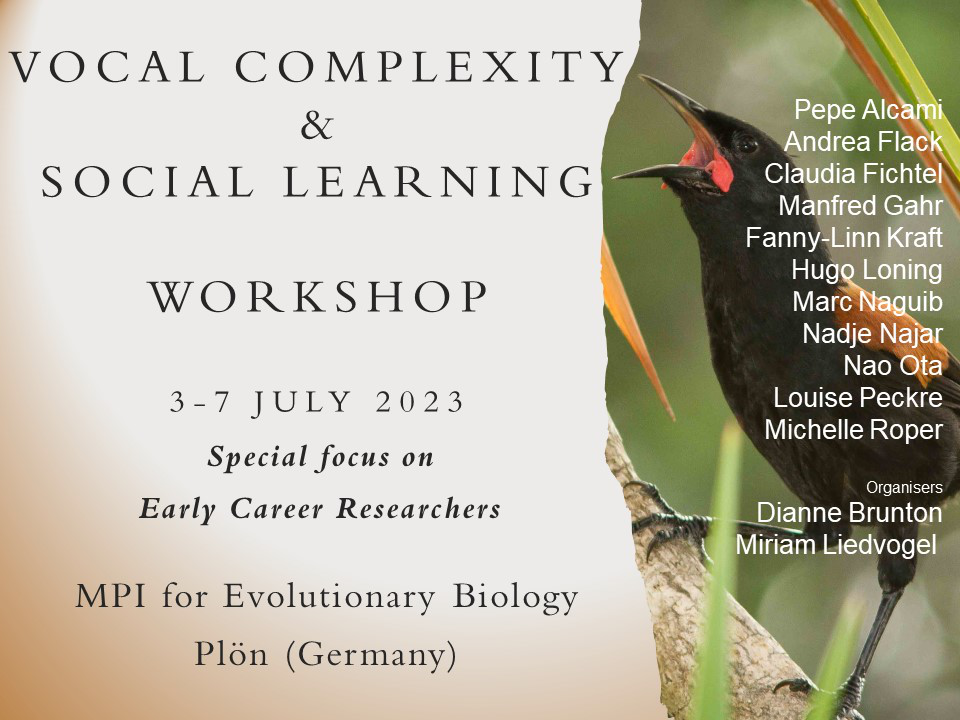Deadline for applications/ abstract submissions: May 19th
Vocal complexity and social learning are defining aspects of behavioural ecology for many species. Research across diverse taxa has provided evidence of positive correlations, and potentially co-evolution, between social and vocal complexity. In addition to field-based and comparative studies of vocal complexity, advances are being made to understand the neural and genetic mechanisms that underpin vocal and social complexity. However, for most species, social environments vary, for example, with life stage, between breeding to non-breeding grounds, and with isolation due to fragmented landscapes. Such social variation makes resolving the co-evolution between social and vocal complexity challenging but also provides opportunities for future research. At this workshop we aim to better understand the challenges for this field and address the following questions:
- Is social complexity a universal driver of vocal complexity? How close are we to having a common theory of the co-evolution of sociality and communication in all animals?
- Can we find common approaches to measuring vocal complexity across taxa?
- What are the underlaying mechanisms that underpin increasing social and vocal complexity?
- What is the role of vocal complexity within changing social contexts (e.g., during migration and dispersal, or within complex societies)
The workshop will bring together researchers studying social complexity, vocal complexity, and underlaying mechanisms of learning, to identify current understanding of the evolution of vocal complexity and to identify key knowledge gaps.
Confirmed speakers:
- Dr Pepe Alcami (neural networks and behaviour, birdsong neurobiology), LMU (Munich), MPI for Biological Intelligence (Seewiesen)
- Professor Claudia Fichtel Leibniz (primate cognition & bioacoustics), Institute for Primatology, Göttingen, Germany
- Professor Andrea Flack, (collective animal behaviour & movement ecology), MPI of Animal Behavior, Konstanz, Germany
- Professor Manfred Gahr, (birdsong - gene expression, endocrinology, neuroanatomy, & behaviour), MPI for Biological Intelligence, Seewiesen, Germany
- Dr. Fanny-Linn H. Kraft, (cognition, sexual selection, & song learning) Stockholm University, Sweden
- Hugo Loning (birdsong learning & behaviour) Wageningen University, Netherlands
- Professor Marc Naguib (animal communication, movement ecology, cognition, conservation), Wageningen University, Netherlands
- Dr Nadje Najar (genomic drivers of behavioral/vocal complexity) University of California Riverside, USA
- Dr Nao Ota (avian bioacoustics & courtship display), MPI for Biological Intelligence, Seewiesen, Germany
- Dr Louise Peckre, (engineer, fundamental & comparative ethology), France
- Dr Michelle Roper, (bioacoustics & syrinx morphology), Massey University, New Zealand
Organisers:
Prof Dianne Brunton, School of Natural Sciences, Massey University, Auckland, New Zealand
Dr Miriam Liedvogel, Institute of Avian Research, University of Oldenburg, Wilhelmshaven, Germany
Registration is free. However, you need to pay for your own travel and accommodation.
There are limited resources to subsidy your travel. Please write us a short e-mail, stating your financial situation and if you have applied elsewhere for travel funds (recommended). We will inform you shortly after the application deadline if we can partly or completely support your travel.

